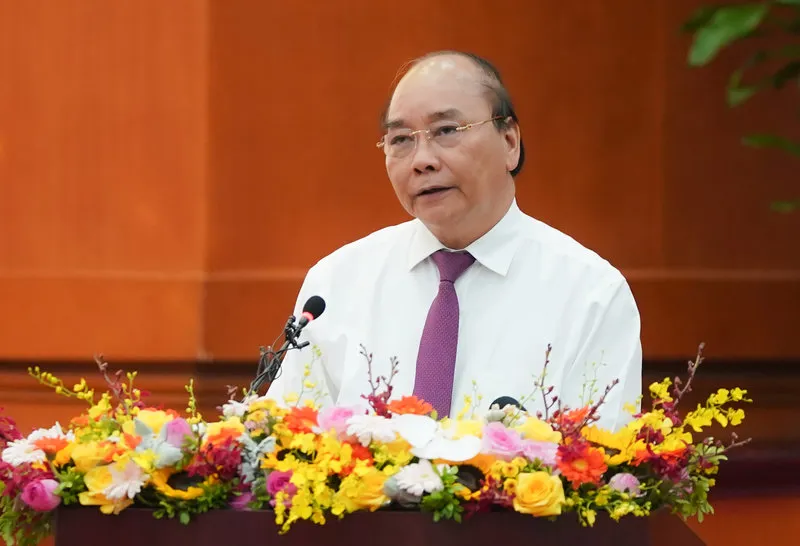Vietnam PM urges more fiscal stimulus to boost economic recovery
Vietnam could widen fiscal deficit and public debt by an additional 3 – 4 percentage points of GDP without affecting the national financial security in the short- and long-terms.
Prime Minister Nguyen Xuan Phuc has required the Ministry of Finance (MoF) to propose more fiscal stimulus packages in forms of tax breaks, deferral of tax payments, as well as measures to mobilize additional resources to stimulate economic growth.
| Vietnam PM Nguyen Xuan Phuc urges more fiscal stimulus packages to boost economic recovery. Photo: VGP. |
With the current public debt below 55% of GDP, significantly lower than the ceiling of 65% set by the National Assembly, Vietnam's fiscal deficit and public debt could widen by an additional 3 – 4 percentage of GDP without affecting the national financial security in the short- and long-terms, Phuc said at a conference of the financial sector on July 7.
The question is how to use state finances in the most efficient way, Phuc added.
Phuc requested the MoF to better maneuver the fiscal policy to address businesses’ concerns and stimulate aggregate demand for higher economic growth.
According to the PM, finance management should not only focus on ensuring the balance of the state budget, but also nurturing sources of revenue and creating driving forces for economic recovery. This is particularly important during this crisis.
The PM asked government agencies to support new business models, production of new materials or energies, along with new driving forces.
The MoF should look for ways to create more resources for socio-economic development and ensure social security, Phuc stated, adding this is the best way to build a strong and sustainable national financial foundation in the mid- and long term.
In the immediate future, the MoF is tasked with supervising market prices, especially state-administered goods and services such as petroleum, electricity, water, education, and healthcare.
The government is determined to keep inflation below 4%, Phuc stressed.
Additionally, the MoF should stabilize and support the development of the stock market and financial services, preventing illegal acquisitions and merging (M&A) activities.
Phuc also requested the MoF to support the disbursement of VND700 trillion (US$30 billion) of public investment targeted for this year, which is considered a key solutions to boost economic growth in the remaining months of 2020.
Among measures to accelerate the disbursement progress, Phuc expected government agencies and local leaders to play a more active role; establish a government’s working group to speed up the process; to allocate funds from projects that suffer delays in disbursement to those having a faster pace, starting from August; to evaluate the performance of ministries, provinces/cities in the disbursement progress.
At the meeting, Minister of Finance Dinh Tien Dung informed that state budget revenue collection in the first six months of 2020 met 44.2% of the year’s target, the lowest since 2013, and was down 10.5% year-on-year.
The government has set up two growth scenarios for this year, in which both public debt and fiscal deficit indicators in the 2016 – 2020 period would stay below the ceilings of 65% and 3.9% of GDP, respectively.
For the first scenario where Vietnam’s GDP growth is forecast at 4.5%, the budget deficit would be around 4.73% of GDP (representing an increase of VND75 trillion (US$3.25 billion) compared to the year’s estimate), and public debt at 55.5% of GDP.
In a worse case scenario with a slower economic expansion of 3.6%, the fiscal deficit will likely be 5.02% of GDP, or VND90 trillion (US$3.9 billion) higher than the estimate, and public debt at 56.4% of GDP.













